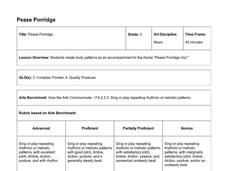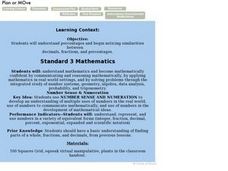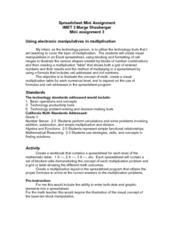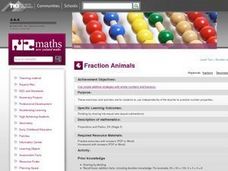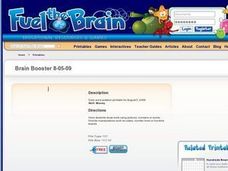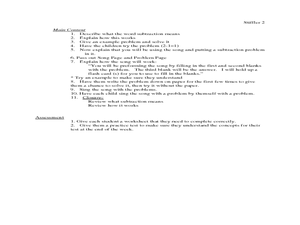Curated OER
Word Processing Can Be Lots of Font!
Explore the basic functions of word processing programs. Young computer users practice deleting, inserting, and changing text. They experience using computer functions as they copy a required poem and complete various computer exercises....
Hawaiʻi State Department of Education
Pease Porridge
Practice using different ways to express a single pattern. The class uses concrete, pictorial, and numerical modes to represent patterns found in a simple rhyme. They will move their bodies, use body percussion, draw, and use numbers to...
Curated OER
Plan or Move
Students note the similarities between decimals, fractions and percentages. They practice converting numbers between these types. They participate in an activity as well.
Curated OER
Using Electronic Manipulatives in Multiplication
Factor polynomials using electronic manipulatives. Your class will create a spreadsheet in excel and use it to multiply and perform basic operations and solve problems correctly. They create a visual to go along with each multiplication...
Curated OER
Generate Measurement Data Word Problems
Beginning graphers will appreciate this practice with basic bar graphs. For each table of data, there is a corresponding graph for learners to match it to. The five data sets all have the same two factors: days and numbers. Although this...
Curated OER
Fraction Animals
Second, third, and fourth graders explore fraction strategies and division by splitting sets of farm animals into equal numbers. Independently, they read word problems, solve them, and check their answers.
Curated OER
Intermediate Short Stories - "A New Cat"
Learners will read a short story in a basic and advanced version. They then answer 3 comprehension questions and 5 vocabulary questions.
Bronx Zoo
How Animals Shape Up
Most drawings are comprised of a set of very basic shapes. Young zoologists examine the shapes that make up different animals they see at the zoo. They'll discuss the shapes that make up a head, body, and legs of an animal and then draw...
Curated OER
Integer War
Sometimes all it takes for a good review is a game of cards. Review the processes needed to add, subtract, divide, and multiply integers. In groups, learners play the card game war with a twist. They can use the numbers as either...
Curated OER
Math Prefixes
Students use a dictionary to gather appropriate information for writing simple definitions. They recognize prefixes that relate to numbers, such as mono-, bi-, and tri-. Pupils use their creative abilities to extrapolate new words to...
Curated OER
Popcorn Fractions
Upper graders explore fractions to determine a fractional part of a whole. They are given 30 pieces of popcorn and asked to divide it into halves, thirds, etc. Students practice representing the popcorn groups as a numerator and...
Curated OER
Application and Modeling of Standard Deviation
The first activity in this resource has learners computing the mean and standard deviation of two different data sets and drawing conclusions based on their results. The second activity has them using a dice-rolling simulation to...
Curated OER
Relate Counting to Addition and Subtraction
Use patterns to practice basic addition; pupils count by two, starting from eight and counting on to 20. They record the five numbers missing from the sequence. Below, the worksheet walks learners through the process they use to count by...
Curated OER
Working with Percentages
Students complete basic operations using percentages in a variety of real world situations. Discounts are computed and compared to a variety of prices listed in local newspaper advertisements.
Curated OER
Dinosaurs
Students are introduced to the various types of dinosaurs and write in their journals about their favorite one. After listening to a story and watching a filmstrip, they color a few pages in their Dinosaur Friends Book. They also examine...
Curated OER
Formatting Fun
Launch this lesson by saving the provided Formatting Fun template on your classroom or library computers. Young learners can then practice formatting basics for use in writing activities. Exercises include practice in highlighting text,...
Curated OER
The National Economy - Measures and Models
Students review economic goals and evaluate progress in achieving those goals. They focus on equity, efficiency, economic freedom and growth. They provide and example of a production decision for the economy as a whole.
Curated OER
Math Crossword Puzzle
This math vocabulary and computation crossword puzzle has learners read 12 clues, solve them and put the answer in a crossword puzzle. There is no word bank for the puzzle which features basic math vocabulary. Example: Do this to get a...
Fuel the Brain
How Much Did They Spend?
Young learners do basic addition (with numbers between 50 and 323), to solve two short word problems. This is a great activity to start the day, or consider using this as a type of summative assessment.
Curated OER
Subtracting from Ten: Using Math with Music
Students explore basic math functions by singing with their classmates. In this addition and subtraction lesson, students sing the song "5 Green and Speckled Frogs"and complete a list of subtraction problems. Students complete a...
Curated OER
Converting Fractions, Decimals, and Percents
Prime or review the steps needed to convert fractions, decimals, and percents. Each slide contains very basic rules of conversion and a few examples of each. The content of this resource is good, but the layout of the text could be better.
Curated OER
One More/One Less Scoop
It's so simple: scoop a spoonful of counters, count them, and then make a set that is one more than that number. Next, make a set that is one less. The tangible nature of this basic addition and subtraction activity will keep learners...
Curated OER
Matrix Operations
Here is a worksheet to practice or review basic matrix operations of addition, subtraction, and scalar multiplication. First, define and discuss key vocabulary terms, then have individuals work five simple problems. There are detailed...
Curated OER
Origami Ducks: Geometry, Listening, and Following Directions
Make origami ducks with your class to reinforce geometry concepts and vocabulary; develop fine motor and visual translation skills; and enrich study of Japanese culture, the pond habitat, or migration. Create a whole group "worksheet"...



